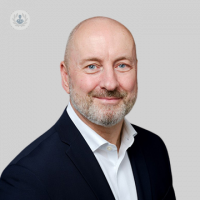Hysteroscopy: is it a painful procedure?
Written in association with:Your gynaecologist may want to perform a hysteroscopy if you are experiencing irregular, heavy or spotting in between your periods or to investigate possible causes of infertility. Here, one of our highly-experienced specialists Mr Andrew Baxter explains whether a hysteroscopy is painful and whether there are any risks involved.

Is a hysteroscopy painful?
Most women experience a crampy, period-like pain during the procedure itself. This is very short-lived and largely settles within 20 minutes afterwards. We do advise that women take a couple of pain relief tablets one hour before the appointment time.
There is local anaesthetic available so if you find the initial part of the procedure uncomfortable do let the nurse and doctor know. It is not routine to inject a local anaesthetic at the start of every procedure as this can be in fact more uncomfortable than the hysteroscopy itself. There is also Entonox or ‘gas and air’ available should it be needed.
When a biopsy is taken from the lining of the womb after the hysteroscope has been removed this causes some crampy period-like pain again for 10-15 seconds.
In over 95% of cases, the outpatient procedure is very well tolerated. However please remember that if you are finding it too uncomfortable do say and the clinician will stop. It may not seem like it, but you are in control! The hysteroscopy can be done at a later date under general anaesthetic if needs be.
Read more: what happens during and after hysteroscopy
Can other procedures be performed at the same time as the hysteroscopy?
As mentioned above it is common to take a biopsy from the lining of the womb, but it may be possible to remove small polyps, as well as coils whose threads have moved up inside the cavity.
It is feasible to remove larger polyps or fibroids and to perform endometrial ablation procedures for heavy periods in women in the out-patient setting. However, these procedures, which are only feasible for women who tolerate the out-patient procedure well, would require further discussion and planning and would not generally be performed at an initial appointment.
Are there any risks?
There is a small risk of developing an infection after hysteroscopy and you may experience some vaginal spotting.
There is a very small risk of the telescope going through the wall of the uterus (perforation). This happens in less than 1 in every 1000 procedures and in fact, is less likely to happen when you are awake, as patients’ increased pain level would warn the doctor that this is occurring.
If perforation does occur you might need to be admitted for observation and given antibiotics, but in most cases, no further action is required. In very rare cases, a laparoscopy (a look inside the abdomen with a telescope under GA) is needed.
Can I have the procedure if I am bleeding on the day?
If you are bleeding significantly you may have to postpone the procedure, although a slight amount of spotting is usually OK. It is advisable to ring the clinic on the day if you are in any doubt.
Do I use contraception up until the procedure?
It is important to ensure that you could not be pregnant on the day of the procedure so please use effective contraception or abstain from intercourse from your last period through to the appointment.
If you are intending to have a Mirena coil changed or taken out you will have to abstain from sex for seven days prior to the clinic visit. If you do not it may not be possible to remove your coil.
You can book an appointment with Mr Baxter via his Top Doctor’s profile here for any of your gynaecological needs.


